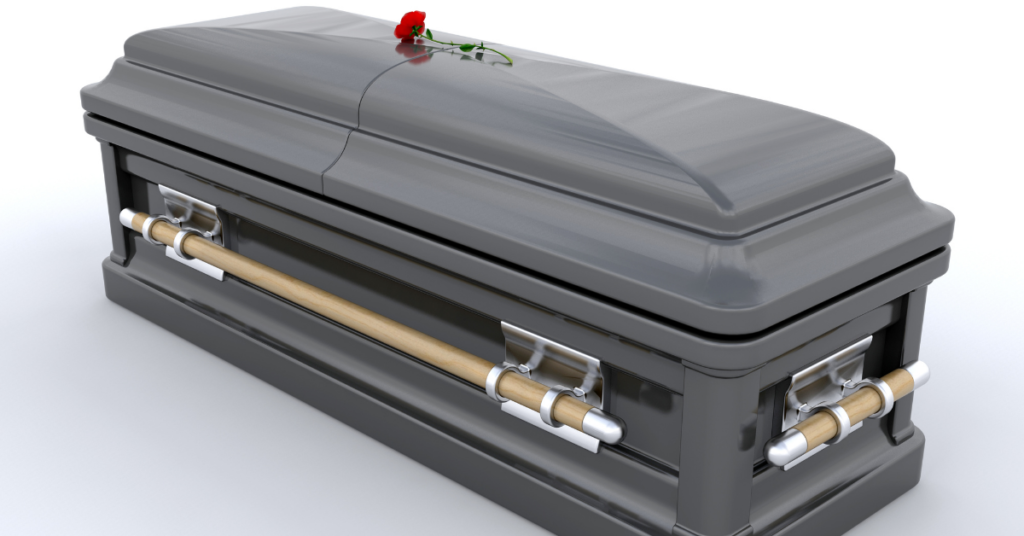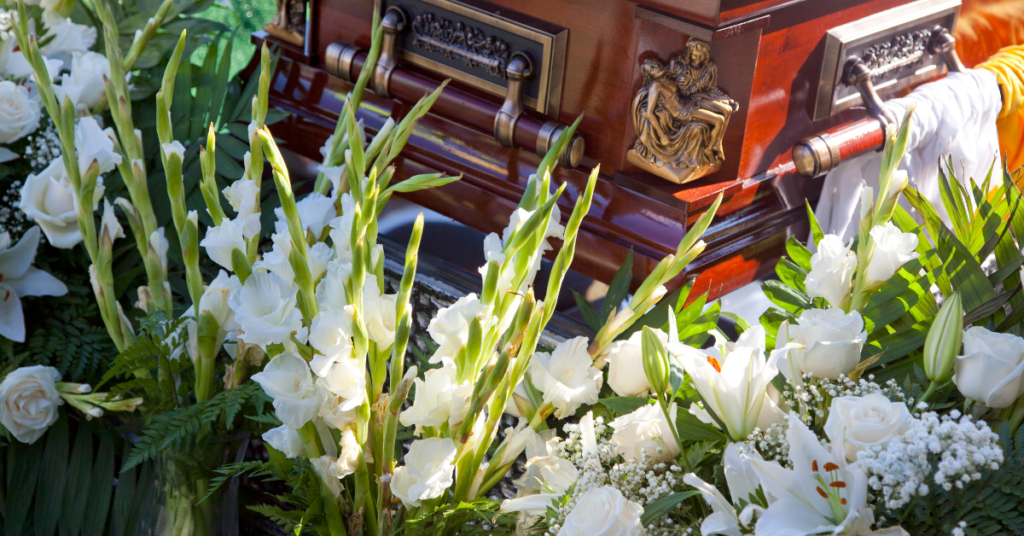12 WEEK FINAL PLANNING GUIDE
Our 12-week final planning guide will help you document your final wishes. Just follow the simple in this article and our Funeral & Estate Planning Guide to make your funeral planning easier.
Be sure to keep your completed Funeral & Estate Planning Guide with your insurance policy and other important financial documents so that your loved ones can follow your wishes after you are gone.
FOR EASIER NAVIGATION:
- Week 1 – Organ And Tissue Donation
- Week 2 – Choosing Your Method Of Disposition
- Week 3 – Choosing A Casket Or Urn
- Week 4 – Choosing A Funeral Home
- Week 5 – Writing An Obituary
- Week 6 – Choosing A Cemetery Or Burial Plot
- Week 7 – Choosing A Headstone
- Week 8 – Choosing Funeral Flowers
- Week 9 – Selecting The Funeral Service
- Week 10 – Preventing Identity Theft
- Week 11 – Proper Medication Disposal
- Week 12 – Liquidating Assets After Your Death
- Bonus Content – Selecting Bible Verses For Your Funeral
Print out and complete our Funeral & Estate Planning Guide and then
keep a copy with your other important legal and financial documents.
WEEK 1 – ORGAN AND TISSUE DONATION
Thinking about organ, tissue, or whole-body donation should be part of your funeral planning. Donation is a great way to help others and advance science. Whole-body donation is an excellent way to avoid the cost of funerals and burial.
If you choose to donate organs or tissues, it is best to do it during your driver’s license renewal. Check the box for “organ donor” for whole body donation. Check the medical schools or independent donation programs near your area.

Whole-body donation programs can provide free copies of death certificates, body transportation, cremation, and the return of your ashes to your family.
Let your family know if you choose to donate your organ, tissue, or body to science. Also, make sure that you leave some instructions in your will so that your loved ones will know what to do when you pass away.
Make a backup plan in case the program declines to accept your body donation. The best way to do it is to purchase a burial insurance policy to cover your end-of-life expenses. This way, you will not be a burden to your family when you pass away.
WEEK 2 – CHOOSING YOUR METHOD OF DISPOSITION
Determine if you want to be buried or cremated. Choosing the best option should be made before you pass away so that your loved ones will know your final wishes.
Choosing between burial and cremation is a personal prerogative. It should be based on your budget, personal beliefs, religion, and other preferences.
We enumerated below the pros and cons of burial and cremation to help you decide on what method of disposition to use.

Burial Pros:
- Burial is traditional and more conventional.
- Most religions around the world widely accept burial.
- Burial provides family and survivors a permanent gravesite to visit.
- Burial allows you to be intern close with your loved ones.
Burial Cons:
- Burial is more expensive than cremation. The average cost of a funeral is around $9,135.
- Visiting a gravesite may be difficult for family members who live far away.
- Burials have a negative effect on the environment.
Cremation Pros:
- Cremation is more affordable than burial.
- Cremation helps save ground space.
- Urns are portable, and family members can take them if they move.
- Cremation offers flexibility in memorialization.
- Cremation is more environmentally friendly than burial.
Cremation Cons:
- Not all religions accept the practice of cremation.
- Cremation is permanent and non-reversible. Remains cannot be exhumed later.
- Cremation is not widely available.
WEEK 3 – CHOOSING A CASKET OR URN
After determining your method of disposition, you can now choose if you want a casket or an urn.
If you decide to go for a traditional burial, it’s time to choose a casket for your funeral arrangements. Deciding which type of casket, you want will prevent your family from overspending during an emotional time.
Do some research on the different types of caskets and their cost. Doing research will help you choose a beautiful casket that fits your budget.

Different Types of Caskets:
- Wooden caskets
- Laminate
- Cloth-covered
- Metal caskets
- Bronze and copper
- Standard steel
- Fiberglass
- Eco-friendly
- Cremation caskets
- Rental caskets
- Do-it-yourself caskets
- Oversize caskets
Where Can You Buy A Casket?
- Funeral homes
- Online providers
- Casket retailers
How to Buy a Casket
Step 1 – Determine what type of casket you want
Step 2 – Consider your budget
Step 3 – Do your research
Step 4 – Visit funeral home or retail showroom
Step 5 – Gather necessary information
Step 6 – Compare prices
Step 7 – Document your casket choice
CHOOSING AN URN
Choosing an urn is your next step if you want to be cremated when you pass away. Determining the type of and the price range will simplify the process for your loved ones.
Cremation urns are available in different styles, shapes, and sizes. You don’t need to buy an urn from a funeral home or crematory, and there are many vendors to choose from.
How to Buy an Urn
Step 1 – Consider your final resting place
Step 2 – Determine your budget
Step 3 – Figure out the size of the urn your need
Step 4 – Determine the type of materials
Step 5 – Choose the type of urn you want and write it in your funeral planning guide.
WEEK 4 – CHOOSING A FUNERAL HOME
Determine what type of funeral services and goods you need to let your family know your preferences.
Step 1 – Determine your method of disposition.
Step 2 – Determine your funeral service preferences
Step 3 – Set a budget
Step 4 – Do your research
Step 5 – Get quotes
Step 6- Compare prices
Step 7 – Visit funeral home facilities
Step 8 – Narrow down your selection
Step 9 – Know the payment options
Step 10 – Make your decision

Guide Questions In Choosing The Right Funeral Home?
- How long have you been in business?
- Are you an independent funeral home?
- Do you belong to any associations or organizations?
- Are your services handled in-house or outsourced to vendors?
- Do you own a crematory?
- What kinds of funeral packages do you offer?
- Do you have separate pricing for urns, caskets, and other funeral goods?
- Will you respect my personal beliefs?
- Can I customize the funeral service?
- What are my payment options?
- Are you familiar with burial insurance? Will you work with my insurance company?
- Are you on call 24/7?
Qualities of a Good Funeral Home
1. Has a good reputation
2. Offers a good location, services, and facility
3. Transparent on cost and product description
4. Accommodates religious and cultural beliefs
5. Employs compassionate staff
6. Willing to provide a personalized experience
7. Uses up-to-date technology
8. Excellent customer service
9. Offers grief support
10. Provides education and community programs
WEEK 5 – WRITING AN OBITUARY
Before you draft your obituary, check your local newspaper and note the format to know what to include. Obituaries are no longer restricted to newspapers. It can also be published on memorial sites and social media.
Different Parts of an Obituary:
1. Announcement of death
2. Summary of your life
3. Family information
4. Funeral or memorial service information
5. Special messages
6. Photo

Tips in Writing an Obituary:
1. Prepare the basic details
- Full name
- Date of birth and age
- City of residence
- Spouse or partner’s name
- Children’s name
- School attended
- Year in the military service
- Honors and awards received
- Organization affiliation
- Religious denomination and address
- Funeral home and address
- Days of visitation and time
- Funeral service date, time, and address
- Memorial service date, time, and address
- Interment date, time, and address
2. Things you should never mention in an obituary
Some things should never go into an obituary because this information can make you and your family vulnerable to identity theft or fraud:
- Complete date of birth
- Complete home address
- Mother’s maiden name
The reason for not including this information is that identity thieves can be a real problem. Some unscrupulous people may try to use your loved one’s identity to access bank accounts and personal credit.
WEEK 6 – CHOOSING A CEMETERY OR BURIAL PLOT
Reserving a burial plot or buying a plot in advance can be cheaper than buying a plot at the last minute.
A burial plot is an asset, and it can appreciate in value with time.

Preventive Measures When Buying A Cemetery or Burial Plots
1. Before buying a burial plot, make sure that the seller is the owner on the record with the cemetery. Suppose the seller inherited the burial plot and the original owner neglected to inform the cemetery. In that case, they won’t be able to transfer the ownership until the inheritance issue is ironed out.
2. Don’t forget to ask what’s included in the price. Some sellers include the headstone in the price.
3. Check what you are paying for. Some sellers only sell the rights to the plot, and you need to pay for an in-ground crypt which may incur additional costs and fees.
WEEK 7 – CHOOSING A HEADSTONE
Choosing a headstone is one important aspect if you want to be buried. Your headstone is one way of memorializing your life after you are gone.
When choosing a headstone, it is crucial to know the cemetery rules and regulations. Set a budget and choose the appropriate materials and design to make the process less stressful.

Steps in Selecting a Headstone:
Step 1 – Consult the memorial park or cemetery you want to be interned about their headstone regulations.
Step 2 – Ask for the cemetery’s installation services
Step 3 – Set a budget
Step 4 – Get yourself familiar with headstone designs and materials
Step 5 – Decide on the type of headstone you need
Step 6 – Select the headstone material
Step 7 – Select the headstone finish
Step 8 – Prepare the inscriptions
Step 9 – Select a headstone supplier
Step 10 – Write your draft
WEEK 8 – CHOOSING FUNERAL FLOWERS
You can choose your funeral flowers or opt to donate to a charity instead of flowers. Write your choice in your funeral planning guide.
Funeral flower arrangements you can choose from:
- Sprays
- Casket sprays
- Inside pieces
- Garlands
- Wreaths
- Funeral baskets
- Vase arrangements
- Specialty arrangements
- Live plants

Write the types of flowers you want for your funeral.
Write the charity or foundation you want and the details if you opt for donation in lieu of flowers.
WEEK 9 – SELECTING THE FUNERAL SERVICE
A funeral service can be a valuable part of the grieving process for your loved ones. Choose the type of funeral service you want.

Here are the traditional funeral or memorial services you can choose from:
- Funeral service, followed by burial or cremation
- Funeral service, followed by graveside service or service at the crematory
- Graveside service followed by burial
- Service at the crematory followed by cremation
- Memorial service after the burial or cremation
- Funeral service at your own home
- Funeral service at the funeral home
- Funeral service at the place of worship
Funeral service can be tailored to your personality. It can reflect your spiritual beliefs, hobbies, or interest. You can also select the venue or site that holds meaning to you.
A funeral service program can feature some songs, a short biography, and your favorite quotes. It will serve as a fitting tribute to your life. After the service, your loved ones can have the time to socialize and enjoy a refreshment while offering support to one another.
WEEK 10 – PREVENTING IDENTITY THEFT
Preventing identity theft after your death must also be included in your funeral planning guide.
Identity theft may attempt to steal the following:
1. Your social security number
2. Your government benefits
3. Your tax returns
4. Your driver’s license
5. Your medical information

Advise your family that identity theft may get your information through the following:
1. Obituaries
2. Death master file
3. Internet
4. Genealogy programs
5. Death certificates
6. Other relevant documents
Here are the different ways to protect your information from identity theft:
1. Advise your loved ones to be mindful of the information on the obituary
2. Contact the social security administration
3. Pull your credit report before reaching out to the credit bureaus
4. Report your death to the credit bureaus
5. Request a death flag
6. Contact all financial institutions you have accounts with, like banks, credit card companies, insurance companies, stockbrokers, other financial institutions
7. Contact every creditor listed in the credit report
8. Ask the Direct Marketing Association to put you on the do not call list.
9. Cancel your identity documents
10. Shut down emails and social media accounts
11. Don’t share personal information
WEEK 11 – PROPER MEDICATION DISPOSAL
Remind your family to dispose of your medication after you are gone. This is necessary if there are small children in the home. Exposure to dangerous medicine is a major cause of unintentional poisoning in children.
Things you should not do with unused medicines:
1. Don’t put unused medicines in the recycle bin,
2. Don’t put medicines in the trash without dissolving them.
3. Don’t give unused medicines to anyone else even if they have the same ailments.
4. Don’t flush the medication down the toilet.

Proper medication disposal:
1. Take-back programs – drop the unused medications at the take-back site. Authorized take-back centers may include hospitals, pharmacies, and local law enforcement agencies.
2. Donation – if the unused medication is unexpired, sealed, and not a narcotic or opioid, you can donate them to some authorized collectors like hospitals, non-profit clinics, law enforcement collection sites, pharmacies, or prescription drug collection programs.
3. Flushing – some medications are labeled good for flushing down the sink or toilet. Check the FDA flush list if the unused medication can be flushed.
4. Dispose of in the trash – follow these steps for proper trash disposal
- Do not crush the pills. Keep the medications in its original container to help identify the contents if they are accidentally ingested.
- Remove or mark out your personal information to make it unreadable, but leave the name and dose of the medication on the container. Blacken your name and prescription number for safety. This will protect your identity and privacy of your health information.
- Add some inedible substance to the medication and then replace the lid.
- For pills: add some soda or water to dissolve the pills.
- For liquid: add something inedible like cayenne pepper, dirt, or cat litter.
- Put the medicines in a leak-proof container like a coffee can.
- Place the bottle or blister packs inside an opaque container like plastic laundry bottle or coffee can.
- Close the lid and secure with packaging or duct tape
- Hide the container in the trash
- Dispose of the trash as close to pick-up day as possible.
WEEK 12 – LIQUIDATING ASSETS AFTER YOUR DEATH
Liquidating assets after your death can be a problem with your beneficiaries. It is important to leave instructions on your funeral planning guide on how you want your assets to be distributed to your beneficiaries to avoid this issue.

Tips on how to liquidate your assets after you pass away:
1. Prepare a will. A will can guide your beneficiaries on the proper estate liquidation. If you have real properties and vehicles, the will dictates who takes it.
2. Create detailed instructions on what you want to do with your properties. Come up with an objective way to divide your properties without creating a rift between your family members.
3. Appoint an executor on your will.
4. Leave detailed instructions on what to do with your unwanted stuff.
BONUS CONTENT – SELECTING BIBLE VERSES FOR YOUR FUNERAL
You can select the bible verses you want to be read at your funeral or memorial service. When selecting the bible verses, look for words that can give comfort to your loved ones upon your passing.

Here are some bible verses that can give comfort:
Ecclesiastes 3:1-4 – For everything, there is a season, and a time for every matter under heaven: a time to be born, and a time to die; a time to plant, and a time to pluck up what is planted; a time to kill, and a time to heal; a time to break down, and a time to build up; a time to weep, and a time to laugh; a time to mourn, and a time to dance.
Ecclesiastes 3:11 – He has made everything appropriate in its time. He has also set eternity in their heart, yet so that man will not find out the work which God has done from the beginning even to the end.
Isaiah 25:8 – He will swallow up death forever, and the Lord God will wipe away tears from all faces, and the reproach of his people he will take away from all the earth, for the Lord has spoken.
Deuteronomy 31:8 – The Lord himself goes before you and will be with you; he will never leave you nor forsake you.
Corinthians 1:5 – For as we share abundantly in Christ’s sufferings, so through Christ, we share abundantly in comfort too.
2 Corinthians 1:3-4 – who comforts us in all our affliction so that we will be able to comfort those who are in any affliction with the comfort with which we ourselves are comforted by God.
Isaiah 57:1-2 – The righteous perish, and no one takes it to heart; the devout are taken away, and no one understands that the righteous are taken away to be spared from evil. Those who walk uprightly enter into peace; they find rest as they lie in death.
John 16:22 – Therefore, you too have grief now; but I will see you again, and your heart will rejoice, and no one will take your joy away from you.
Psalm 9:9 – The LORD also will be a stronghold for the oppressed, A stronghold in times of trouble;
Psalm 46:1 – God is our refuge and strength. A very present help in trouble.
Psalms 34:18 – The Lord is near to the brokenhearted and saves the crushed in Spirit.
Revelation 21:4 – He will wipe every tear from their eyes. There will be no more death or mourning or crying or pain, for the old order of things has passed away.
Hebrews 13:5 – God has said, ‘Never will I leave you; never will I forsake you.
Isaiah 41:10 – So do not fear, for I am with you; do not be dismayed, for I am your God. I will strengthen you and help you; I will uphold you with my righteous right hand.
Isaiah 66:13 – As a mother comforts her child, so will I comfort you.
Jeremiah 31:13 – For I will turn their mourning into joy and will comfort them, and make them rejoice from their sorrow.
John 14:18 – I will not leave you comfortless: I will come to you.
John 16:22 – You are now very sad. But later, I will see you, and you will be so happy that no one will be able to change the way you feel.
Lamentations 3:31-33 – For no one is cast off by the Lord forever.
Though he brings grief, he will show compassion, so great is his unfailing love. For he does not willingly bring affliction or grief to anyone.
1 Chronicle 16:11 – Seek the LORD and his strength; seek his presence continually!
Deuteronomy 31:8 – It is the Lord who goes before you. He will be with you; he will not fail you or forsake you. Do not fear or be dismayed.
Exodus 15:2 – The Lord is my strength and my song; he has given me victory. This is my God, and I will praise him— my Father’s God, and I will exalt him!
Exodus 33:14 – My presence will go with you, and I will give you rest.
Isaiah 26: 3-4 – Those of steadfast mind you keep in peace—because they trust in you. Trust in the Lord forever, for, in the Lord God, you have an everlasting rock.
Isaiah 41:10 – So do not fear, for I am with you; do not be dismayed, for I am your God. I will strengthen you and help you; I will uphold you with my righteous right hand.
Nehemiah 8:10 – Do not grieve, for the joy of the Lord is your strength.
Proverbs 18:10 – The name of the Lord is a strong tower; the righteous run into it and are safe.

